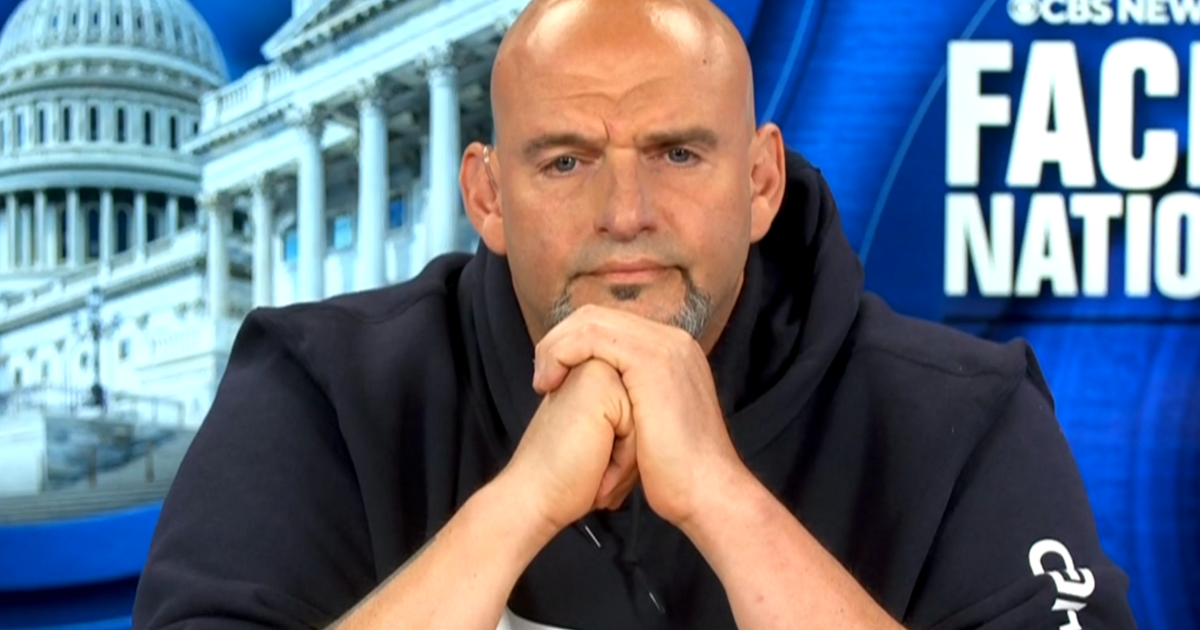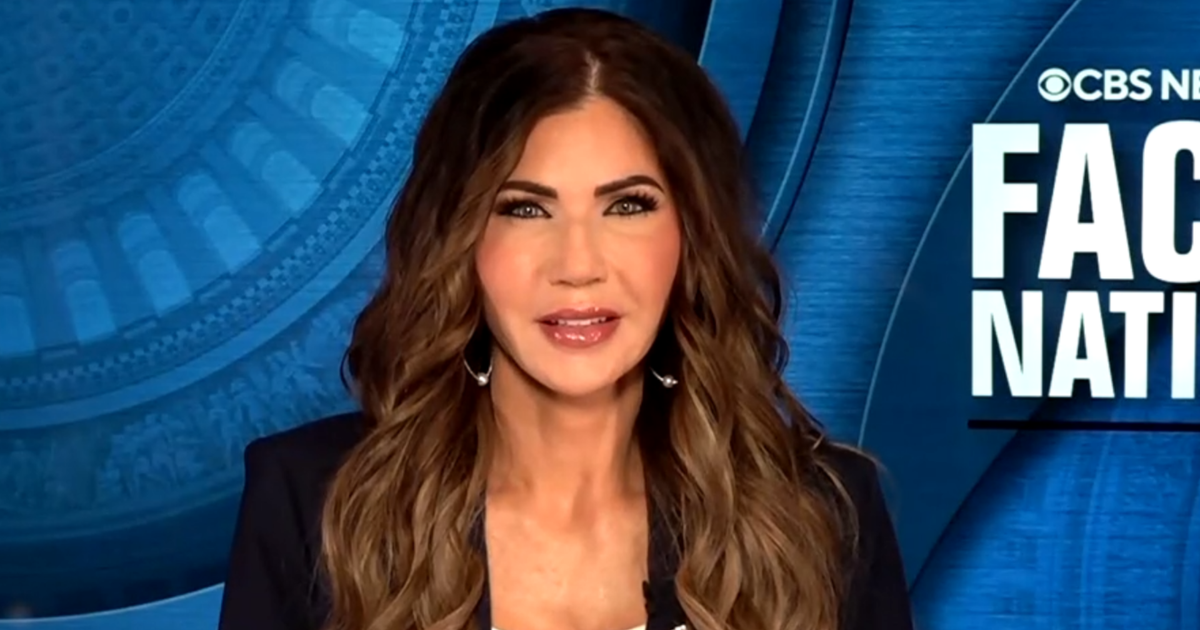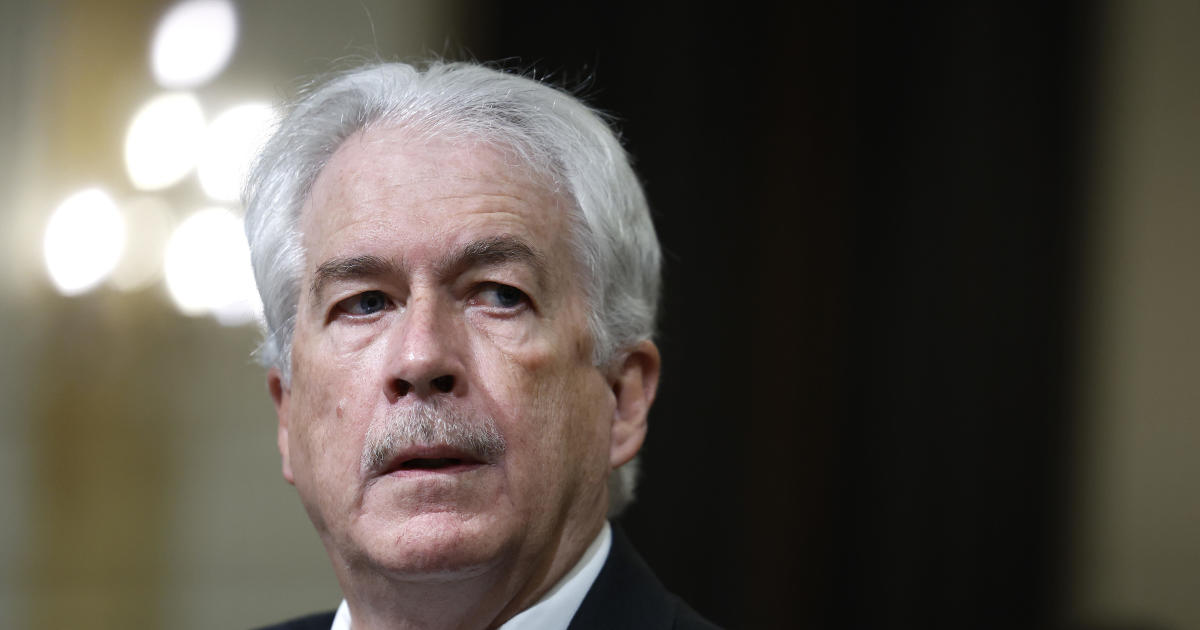Transcript: CBS News interviews U.S. Customs and Border Protection Commissioner Chris Magnus
The following is a transcript of an August 18 interview with Customs and Border Protection (CBP) Commissioner Chris Magnus, who told CBS News that the Title 42 pandemic-era policy has had a "human cost," stranding migrant families in Mexico under "very difficult" conditions. The transcript was slightly edited for clarity.
CAMILO MONTOYA-GALVEZ, CBS NEWS: Let's jump right in. Your agency, sir, right now is reporting unprecedented levels of migrant encounters along the U.S.-Mexico border. There has been a recent drop, but the annual tally for this fiscal year has already surpassed the record set in fiscal year 2021 — and you're set to record over 2 million encounters along the U.S.-Mexico border. Do you think these migration numbers will ever return to pre-pandemic levels, or is this the new normal?
CHRIS MAGNUS, CBP COMMISSIONER: There's no question that the numbers are high and hard to know exactly what the impact the pandemic has (had). Certainly, it has had an impact. But I think what we're really seeing is a pattern of irregular migration that not only the United States is experiencing, but countries all over the world are seeing. There's unprecedented levels of cartel and gang violence in other countries, political upheaval. People are at real risk. Some of them really (face) such danger for their families, themselves, that they see no alternative but to flee. There're environmental considerations, lots of things. So, hard to know. Will it return to pre-pandemic levels? I'm not sure we'll know for sure. But we'll see over time.
CAMILO MONTOYA-GALVEZ: But the projections you're seeing, sir, do they show that these numbers will continue to be high in the fall, for example?
COMMISSIONER MAGNUS: Again, I think no one knows for sure. Even our projections are uncertain. We're working closely with the Mexican government, with other foreign governments to try to get a sense of how many caravans and groups are headed our way. But there're so many factors that could change this number that (it's) hard to be sure.
CAMILO MONTOYA-GALVEZ: And sir, you mentioned the country conditions such as poverty, violence, that prompt people to come to the U.S.-Mexico border and to cross the border illegally. Republican lawmakers would say that this historic migration wave is a direct result of Biden administration policies and rhetoric. I wonder if you think whether it's possible that this unprecedented level of migration that we're seeing right now is caused by country conditions, the political repression in some countries, extreme poverty and hunger in others, but also the fact that smugglers are taking advantage of what they see as more welcoming policies?
COMMISSIONER MAGNUS: Well, I think smugglers are taking advantage of the fact that they have a very vulnerable population of people that will do almost anything, take their life savings, and use it as an opportunity to flee, even if it means putting themselves in the hands of smugglers and traffickers that will put themselves and their families at incredible risk. It shows the level of desperation. I don't think it's fair to say that there's any one particular push or pull factor. I think there's some of both, but one thing we know for sure, is that there are irregular immigration patterns we're dealing with that involve many different factors. It's a very complex set of dynamics.
CAMILO MONTOYA-GALVEZ: Do you think Biden administration policy has, in any way, contributed to this influx?
COMMISSIONER MAGNUS: I think this administration has committed to following the law as it relates to asylum. I think we've committed to treating people humanely and following the law. But I think we've also made it clear that the border is not open. And we are doing the best within the resources we have to provide consequences for those who break the law and come across the border.
CAMILO MONTOYA-GALVEZ: Do you think smugglers take advantage of that, of more humane enforcement of U.S. immigration law?
COMMISSIONER MAGNUS: I think we are doing enforcement in a humane way. But I think we're, in particular, trying to do the processing of people who come across the border humanely. That's our obligation. I come from a law enforcement background, over four years in policing. And one of the things I've always impressed upon my officers is that if we arrest people, when we process them, going into jail, or wherever it might be, our obligation is to treat them humanely and with respect. So, I think that's important to the administration. It's certainly important to me.
CAMILO MONTOYA-GALVEZ: As you know, commissioner, right now your agents are enforcing the CDC's Title 42 order to expel roughly half of the migrants you encounter along the U.S.-Mexico border. But Title 42 has been in place for over two years now, and migration has remained very high. The policy is also partly responsible for inflating these numbers because it encourages repeat crossings and your agency has acknowledged that. You have acknowledged that. You also cannot apply Title 42 to certain nationalities, including Venezuelans, Cubans and others who are coming to the border in record numbers. And I know that the administration says that this is a CDC public health order, and obviously the CDC tried to end it but a federal court blocked that, but from your perspective at CBP, is Title 42 an effective border enforcement policy, given the factors that I just laid out, or is it doing more harm than good right now operationally?
COMMISSIONER MAGNUS: Well, I think in some ways, it has value. It has helped to limit the number of migrants coming across the border. And it also, I mean, it has had certainly some public health value in the past. No question about that.
CAMILO MONTOYA-GALVEZ: In the past.
COMMISSIONER MAGNUS: Correct. But I would also say that it is frustrating for our agents and officers in that we are, you know, we're expelling many people, many migrants who are covered under Title 42, only to see them attempt and in fact, in some cases even successfully re-cross the border, over and over again, because under Title 42, there are no consequences. I think there is a sense that when Title 42 ends at some point, at least the use of Title 8, which is your basic immigration law, will provide more consequences, which may be helpful in terms of dealing with repeat crossers and others who are breaking the law.
CAMILO MONTOYA-GALVEZ: But is it still an effective operational tool? You recently tweeted an article that highlighted the impact of this policy on families who are seeking asylum. Because obviously under Title 42, as you know, people cannot request asylum.
COMMISSIONER MAGNUS: Well, under Title 42, there are still ways that vulnerable populations can present themselves and be considered through a Title 8 process for asylum. But it's true that the vast majority of individuals from a number of the countries, including Mexico, are turned around based on Title 42. So, it does limit the number of people coming into the country. But one of the things that I think can't be denied is that conditions are very, very difficult for the individuals who are returned to Mexico. We know that some of the shelters, some of the other places where migrants find themselves waiting, are not great for families and children. And I think, you know, we have to keep that in mind. There are certainly some advantages to Title 42. But there's also a human cost to it.
CAMILO MONTOYA-GALVEZ: How long do you expect your agency to continue this policy? I know you're bound by law because of the court order to continue it, but do you see this policy being in place next year?
COMMISSIONER MAGNUS: Honestly, it's so hard to know based on the fluctuation and varied instances of different court rulings. I mean, we just don't know what's going to happen next. But I think the important thing is that no matter how different courts rule, if Title 42 ultimately goes away, we're going to be ready for that. I think we've done a lot to bring additional personnel to the border. We've looked at ways to get border agents back on the line by having what we call border processing agents. These are border processing coordinators really and what they are non-sworn personnel who are able to do a lot of the processing work. We have also contractors that we bring in. These are folks who can do processing work that allows, again, agents to be back out in the field. In fact, as a result of that work so far, we've been able to bring 542 agents back out on the line. So, we're continually looking at those kinds of resources.
CAMILO MONTOYA-GALVEZ: In April, commissioner, we saw this unprecedented spike in the number of Ukrainians flying to Mexico and then showing up at the U.S. border to request entry. Your agency quickly set up this process for them to enter the U.S. through ports of entry, especially in California. And in that month, in April, 20,000 Ukrainians were processed in a very orderly and quick fashion. Why hasn't that process been available to other nationalities, such as Central Americans and Haitians, who are also requesting protection so they can seek asylum at the ports of entry? And wouldn't increased processing at those ports of entry discourage people from trying to cross the border illegally?
COMMISSIONER MAGNUS: Well, I mean, I think what you're describing highlights the fact that we have a fundamentally broken immigration system. I think all of us in law enforcement would like to see more legal pathways put in place for persons who are seeking to come into the country. We know there are people that are seeking employment. Actually, we have many jobs that are unfilled in this country. There certainly seems like there ought to be ways to put policy and law into place that would allow orderly processes for people who have been vetted and determined not to be a risk to come into the country to work, or under other appropriate circumstances. I think that's something we strongly support.
CAMILO MONTOYA-GALVEZ: Are you planning to increase port of entry processing for asylum-seekers from other nationalities, so they don't have to, or they don't feel like they have to, cross illegally in between the ports of entry?
COMMISSIONER MAGNUS: Well, part of the challenge at ports of entry is that we have to maintain a balance, a balance between obviously people who are coming through the ports on a daily basis, whether it be for travel or especially trade purposes. And this is a difficult balance to achieve, because we have limited resources, limited numbers of personnel available at these ports of entry. And so this is going to continue to be a difficult balancing act.
CAMILO MONTOYA-GALVEZ: But you do hope to one day increase processing at these ports?
COMMISSIONER MAGNUS: Absolutely.
CAMILO MONTOYA-GALVEZ: Is that a goal?
COMMISSIONER MAGNUS: No, that is the goal. We'd like to see people come legally through ports of entry. And we hope that there'll be more opportunities.
CAMILO MONTOYA-GALVEZ: Because it can be done, because of the Ukrainian example that I highlighted.
COMMISSIONER MAGNUS: It can be done. But obviously we're talking about different populations from different countries with different needs who are going to need to be processed differently. So, there are a lot of factors involved. What works for one population does not necessarily work for all.
CAMILO MONTOYA-GALVEZ: And that's a good transition to my next question. Some critics would argue that the processing of Ukrainians in April shows that U.S. border policy is unequal or even discriminatory. Can you respond to that? And do you think there can be a way to have more uniform, consistent rules for processing all migrants?
COMMISSIONER MAGNUS: Well, look, our goal certainly is to be able to process all vulnerable populations in a fair and equitable way. I think this is something that we're going to continue to work towards. It can be very challenging, depending on the circumstances. There are people coming from countries that have, you know, the Ukraine, for example, is in the middle of a war going on there. There are specific circumstances that involve that population that may not always apply to another. But our goal, no matter what, is to try to assure that vulnerable populations are processed fairly.
CAMILO MONTOYA-GALVEZ: And shifting gears a bit commissioner, DHS Secretary Alejandro Mayorkas has acknowledged that morale among your Border Patrol agents is low. Their resources are strained. And frankly, I think you know this commissioner, many of them disagree with your administration's policies — and some of them have made that clear. Do you think there's sufficient trust between your administration and frontline Border Patrol agents to achieve common objectives, and how are you making sure that they have the resources that they need along the border?
COMMISSIONER MAGNUS: CBP personnel, Border Patrol agents across the board are professionals. These are personnel who have worked, in some cases, under many different administrations. They understand that they have a law enforcement mission to complete. And as professionals, they do that. It's not entirely different from, again, police departments where I've worked as a chief, where officers may have very different opinions about one mayor or city council or another. They may agree or disagree with some policies. But nonetheless, they're professionals, they're going to enforce the law, they're going to follow the policies and directives they're given. I understand how morale is difficult for these agents and officers who are working under very difficult circumstances on the border. The secretary and I both have a strong commitment to get as many officers back out on the line. I think that will help with morale, because that's certainly what agents signed up to be doing. And as I said, we've already brought in border processing coordinators and others to help with the processing, and, as a result, already 542 agents are back out on the line. We're looking at ways in the president's proposed budget to hire additional processing coordinators and agents, 300 of both, we hope. And to me, there's more to it, though, than just, you know, more agents out in the field. I think we have to take better care of our personnel. One of my highest priorities is officer wellness and resiliency, which means addressing mental health needs, the challenges that come when agents are separated from their families, sometimes by great distances. Dealing with issues like suicide prevention. These are all things that we're already making a strong investment in. For example, we are bringing 13 psychologists out into the field across the border, to provide services and referrals and work with our people. So, I think these are all things that help address morale. There's no one thing that's going to work, but I think we're dealing with professionals, and we can help.
CAMILO MONTOYA-GALVEZ: Commissioner, I understand that border policy, as we've discussed, is very complicated and nuanced. And processing decisions are based on migrants' nationality, their age, the sector where they cross and foreign relations even, with Mexico and other countries. But I think some Americans, and not just Republicans, when they see footage of large numbers of migrants entering the U.S. illegally, they believe that there's chaos at the border, and that your agency does not have control over the situation. Do you understand why some Americans may feel that way? And what would you tell them?
COMMISSIONER MAGNUS: I would tell them that we have already put, and are continuing to put, many practices into place to assure that we handle the migrants who come into this country in a safe, orderly and thoughtful way. For example, in areas where we have large numbers of migrants coming, we have the ability to do what we refer to as de-compression, where we move migrants to other sectors, other areas for processing, so no one particular area has to be overwhelmed. We're working very closely with our nonprofit partners, and our state and local governments, to help address the numbers — and they fluctuate — of migrants who are coming across. We're working to become as effective as possible in how we process this population, always looking out to safeguard the welfare of the larger American population. So, I think we're doing very well; we're learning as we go. Every time we fall short of our own expectations, we look for ways to do things better. This is a learning organization. One of the things I've been most impressed about CBP. But I would push back on the idea that this means chaos. I think we have the ability, and we've already shown it, to deal with even large numbers of migrants in an orderly, compassionate and effective manner.



